Events
Events
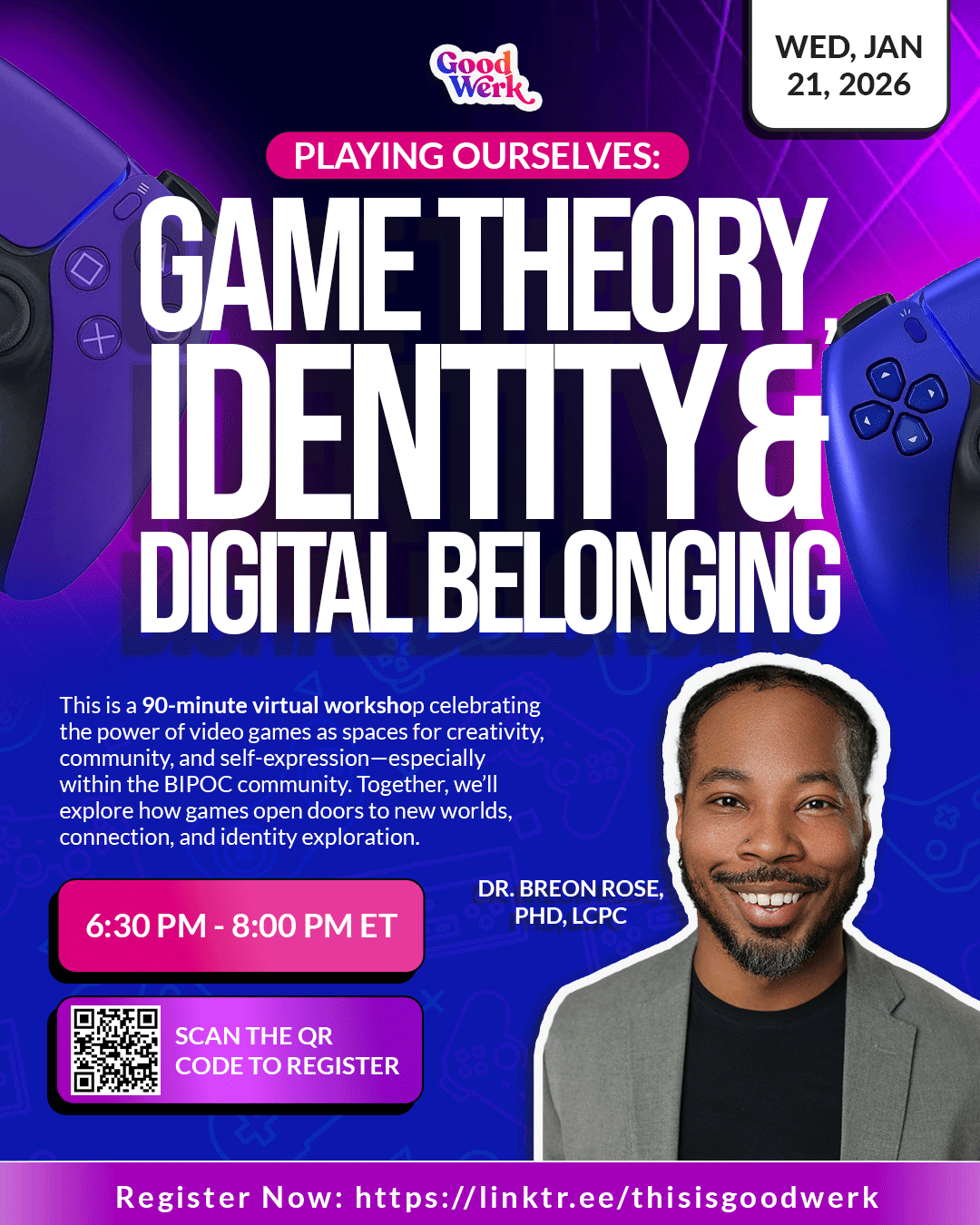
Playing Ourselves: Game Theory, Identity, & Digital Belonging
Register Today:https://us02web.zoom.us/meeting/register/7KAE7mJzQISyDMyhkFHrAw
Video games aren’t just play—they’re spaces where creativity, connection, and self-expression come alive. Especially for BIPOC communities, digital worlds can open doors to belonging, collaboration, and joy. That’s why creating intentional, affirming online spaces matters.
🎮 Playing Ourselves: Game Theory, Identity, & Digital Belonging is a 90-minute virtual workshop designed to explore how games can empower us, spark imagination, and build community. Together, we’ll reflect on self-expression, share stories of connection, and discuss collaboration and strategy in digital spaces.
From interactive gameplay and avatar creation to discussions on community and leadership, each experience is crafted to inspire creativity, foster confidence, and celebrate the joy of digital belonging. Participants will leave with tools, insights, and shared experiences that reimagine online spaces as affirming, inclusive, and culturally expressive.
If you’re ready to explore how play can deepen connection, ignite creativity, and strengthen community—this workshop is your invitation to step into a digital space full of possibility, joy, and belonging.

The Year-End Unwind
Register Today:https://us02web.zoom.us/meeting/register/OsUiyxT3QlGbLMwQiuS_Kg#/registration
The end of the year can stir up a mix of exhaustion, gratitude, pressure, and possibility. And for many of us—especially those balancing community care, cultural expectations, and personal responsibilities—the holidays can feel like a lot. That’s exactly why creating intentional, affirming spaces matters.
The Year-End Unwind: Joy, Reflection & Community is a 2-hour virtual holiday festival designed to help you close out 2025 with ease, connection, and joy. This gathering blends everything we love about a cozy holiday party with the grounding energy of a reflective retreat—inviting participants to laugh, breathe, create, and celebrate in ways that feel nourishing and culturally aligned.
Together, we’ll explore what it means to slow down, reconnect with ourselves, and find joy in community as we prepare for a new year. With festive breakout rooms, creative activities, games, and movement this event offers something for everyone—individuals, families, and community members of all ages.
From guided reflection and visioning, to art-making and game night energy, to dance breaks that melt stress right off your shoulders, each experience is designed to support restoration, creativity, and celebration. Through shared moments, collective release, and joyful connection, participants are invited to close the year with intention while embracing the lightness and laughter we all deserve.
If you’re craving a space that feels warm, grounding, and joy-filled—this is your invitation to unwind, recharge, and enter 2026 feeling supported, renewed, and in community.

Healing on Our Terms: Reclaiming Care, Culture, & Community
Register Today: https://us02web.zoom.us/meeting/register/Mw1wk7JFS9WvXTY6SESrsg#/registration
Healing isn’t one-size-fits-all—it's cultural, communal, and shaped by lived experience. For many marginalized communities, navigating traditional healthcare systems can feel isolating, invalidating, or outright harmful. And when the systems meant to support us fall short, emotional and mental well-being often take the hit.
Healing on Our Terms: Reclaiming Care, Culture, & Community is a 90-minute virtual workshop designed to help participants reimagine what care can look like when it honors identity, culture, justice, and autonomy. This space invites honest reflection on the medical barriers and biases that have shaped our communities, while offering practical, grounded tools for finding support that truly aligns with who we are.
Together, we’ll explore how to identify culturally responsive providers, advocate for ourselves (and those we love), and integrate holistic and natural practices into daily emotional wellness. Through shared wisdom and collective grounding, this workshop creates room for participants to reclaim healing in ways that feel protective, empowering, and deeply affirming.
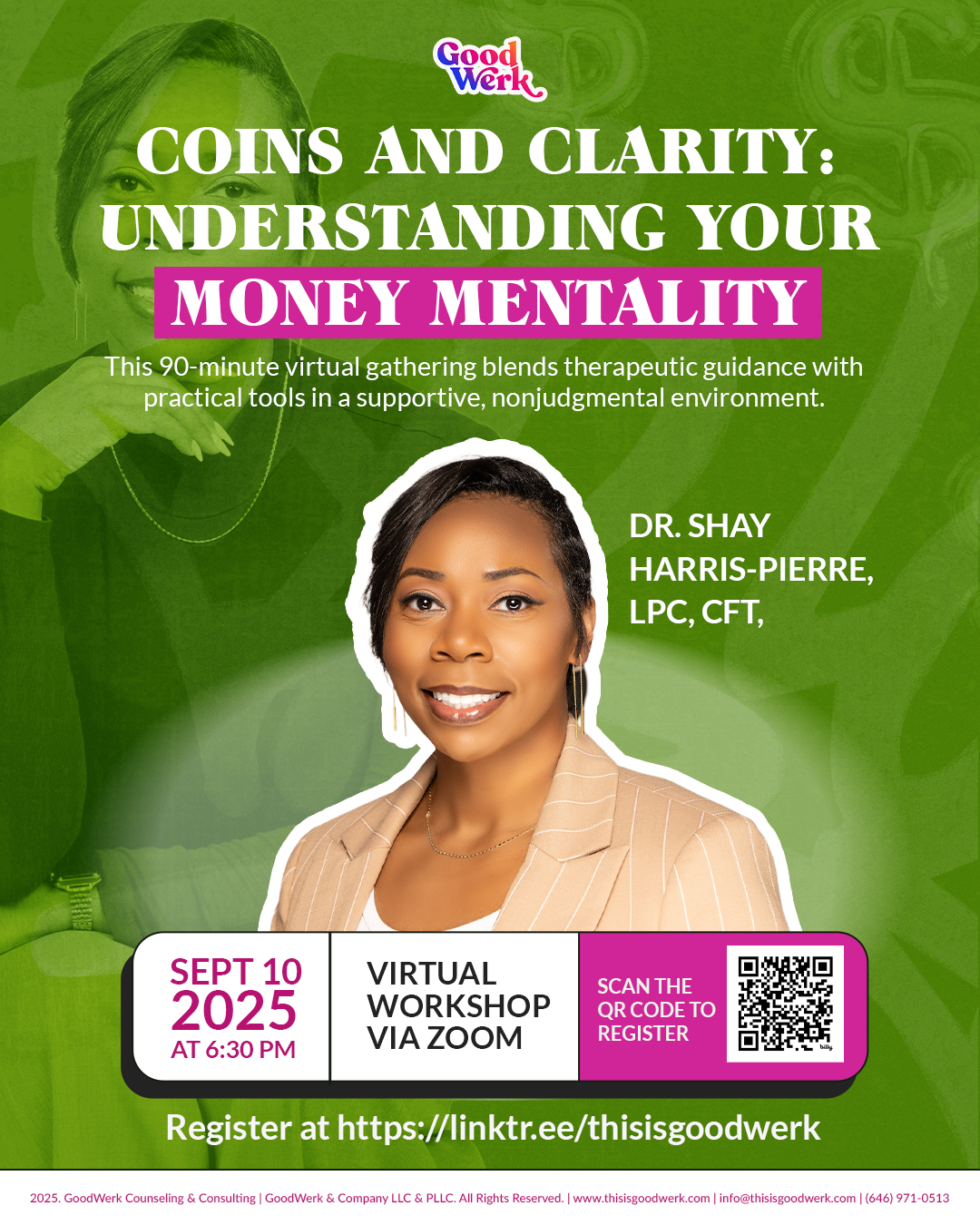
Coins and Clarity: Understanding your Money Mentality
Register Today: https://us02web.zoom.us/meeting/register/MGq8bioSR5idOnwj9G91ug
Money isn't just math—it's emotional, generational, and deeply personal. For many, financial stress isn’t just about numbers on a spreadsheet; it’s tied to shame, scarcity, survival, and self-worth. And when our finances feel out of control, our mental health often follows.
This therapeutic session is designed to help participants explore the emotional side of money and the direct impact financial stress can have on our mental health. Whether you're living paycheck to paycheck, navigating debt, supporting family, or working to build generational wealth, this space offers tools to support both emotional clarity and financial confidence.
We’ll blend therapeutic guidance with practical tools in a supportive, nonjudgmental environment. Led by Dr. Shay Harris-Pierre, a licensed therapist and a financial wellness professional, participants will explore how mental health and money are interconnected—creating space to better understand patterns, release financial shame, and begin the work of healing their relationship with money.
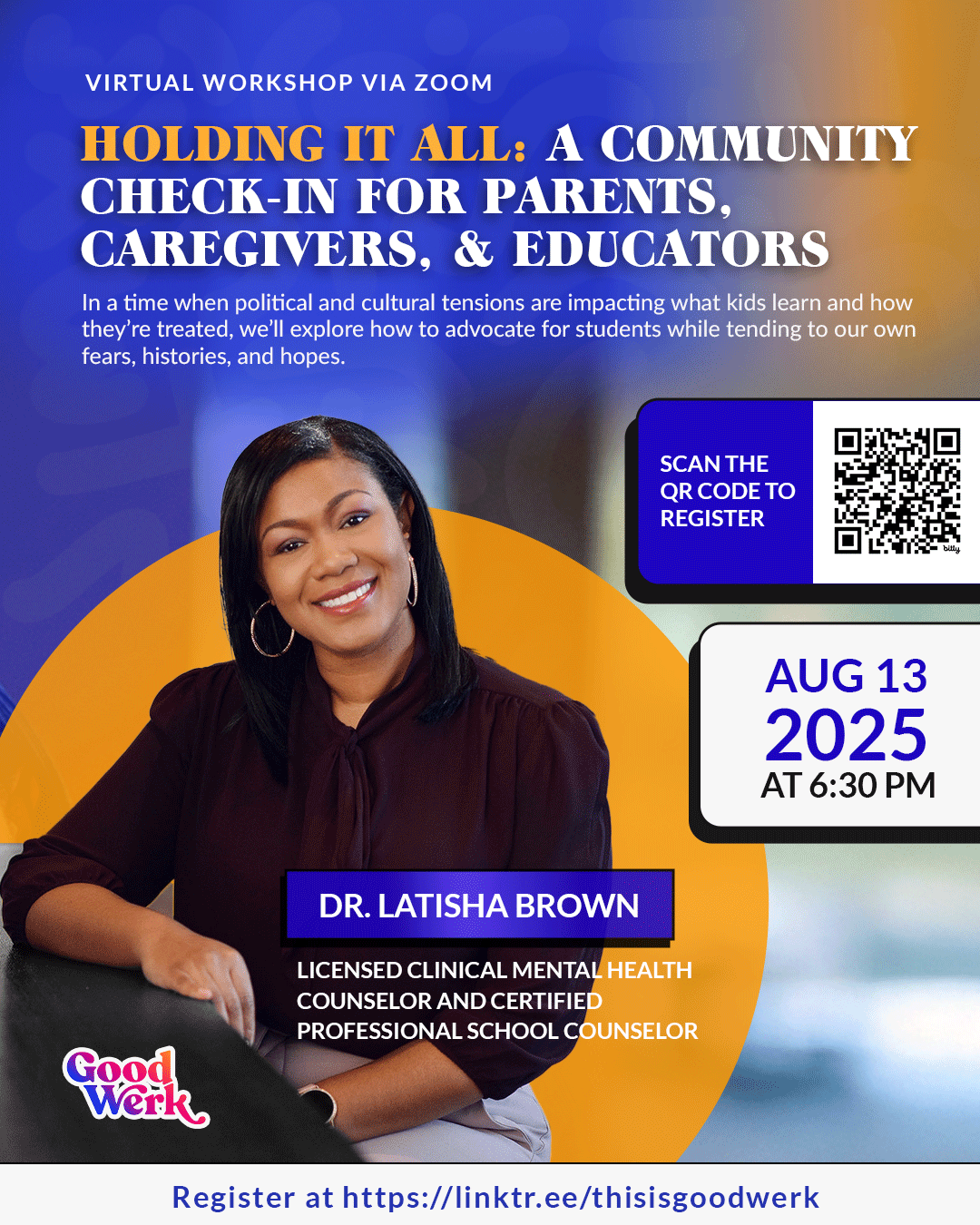
Holding It All: A Community Check-In for Parents, Caregivers, & Educators
As the school year approaches, families are preparing for much more than backpacks and bus schedules. The realities of today’s classrooms are shaped by generational trauma, the unrelenting pace of digital life, and growing mental health needs. But for many caregivers—especially immigrant families, those raising trans youth, or children with disabilities—there’s also a deep anxiety about safety, inclusion, and how to protect kids in systems they can’t fully control.
Led by Dr. Latisha Brown, this is a virtual gathering for caregivers and educators to pause, reflect, and prepare—emotionally, mentally, and practically—for the school year ahead. In a time when political and cultural tensions are impacting what kids learn and how they’re treated, we’ll explore how to advocate for students while tending to our own fears, histories, and hopes.
This space offers tools to help young people thrive both academically and emotionally—while also acknowledging the wounds and worries many caregivers carry into the school year.
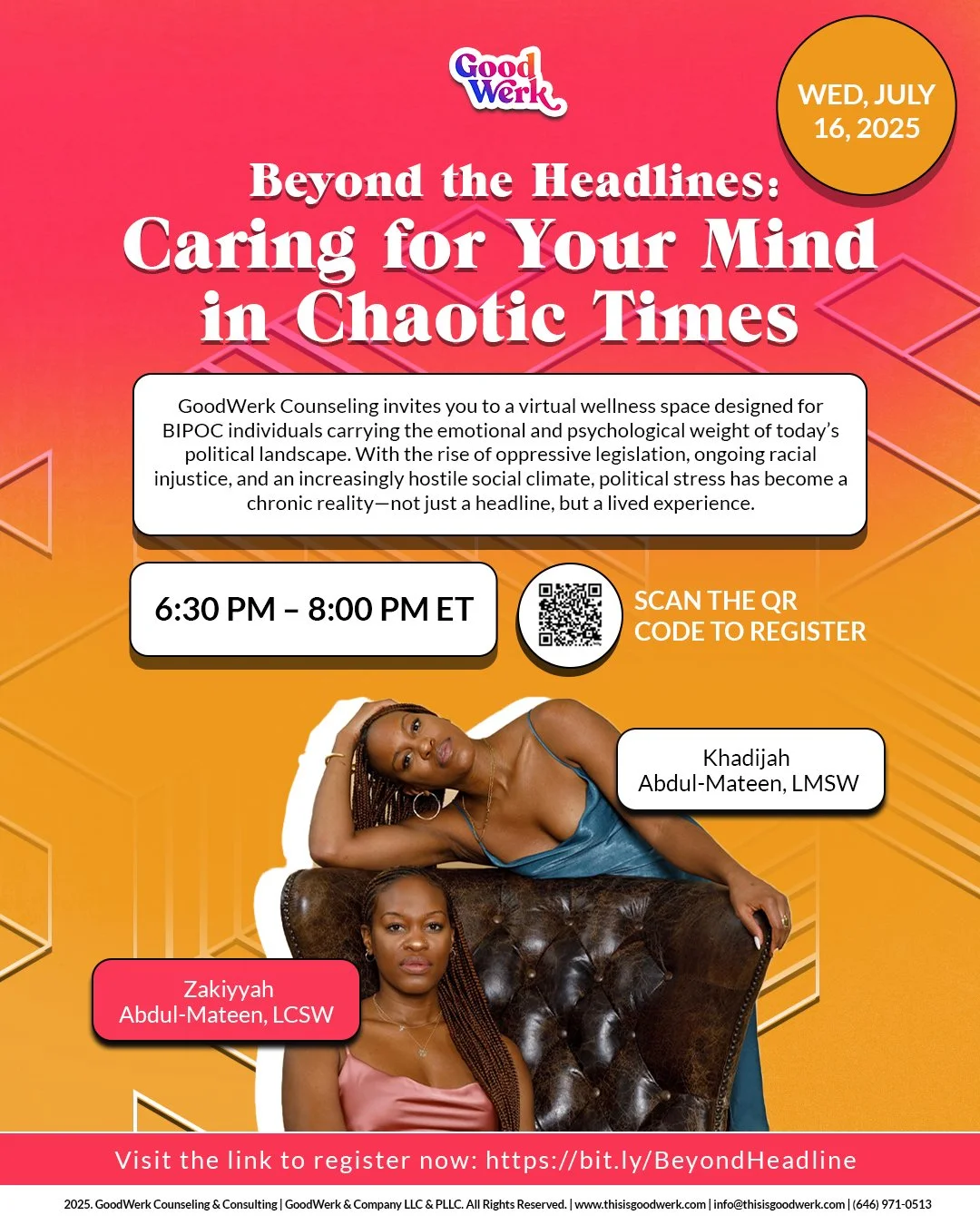
Beyond the Headlines: Caring for Your Mind in Chaotic Times
With the rise of oppressive legislation, ongoing racial injustice, and an increasingly hostile social climate, political stress has become a chronic reality—not just a headline, but a lived experience.
Led by Zakiyyah and Khadijah Abdul-Mateen, This workshop will unpack how constant exposure to political tension, violence, and uncertainty impacts mental health. From voter suppression to anti-LGBTQ+ policies to the ongoing fight for racial equity, BIPOC communities are often on the front lines—advocating for change while also coping with fear, anger, fatigue, and grief.
Participants will explore what it means to care for themselves in a world that demands resilience, yet often ignores the cost. Through reflective prompts, community dialogue, and grounding strategies, this session will help participants pause, process, and protect their mental well-being without disconnecting from what matters.
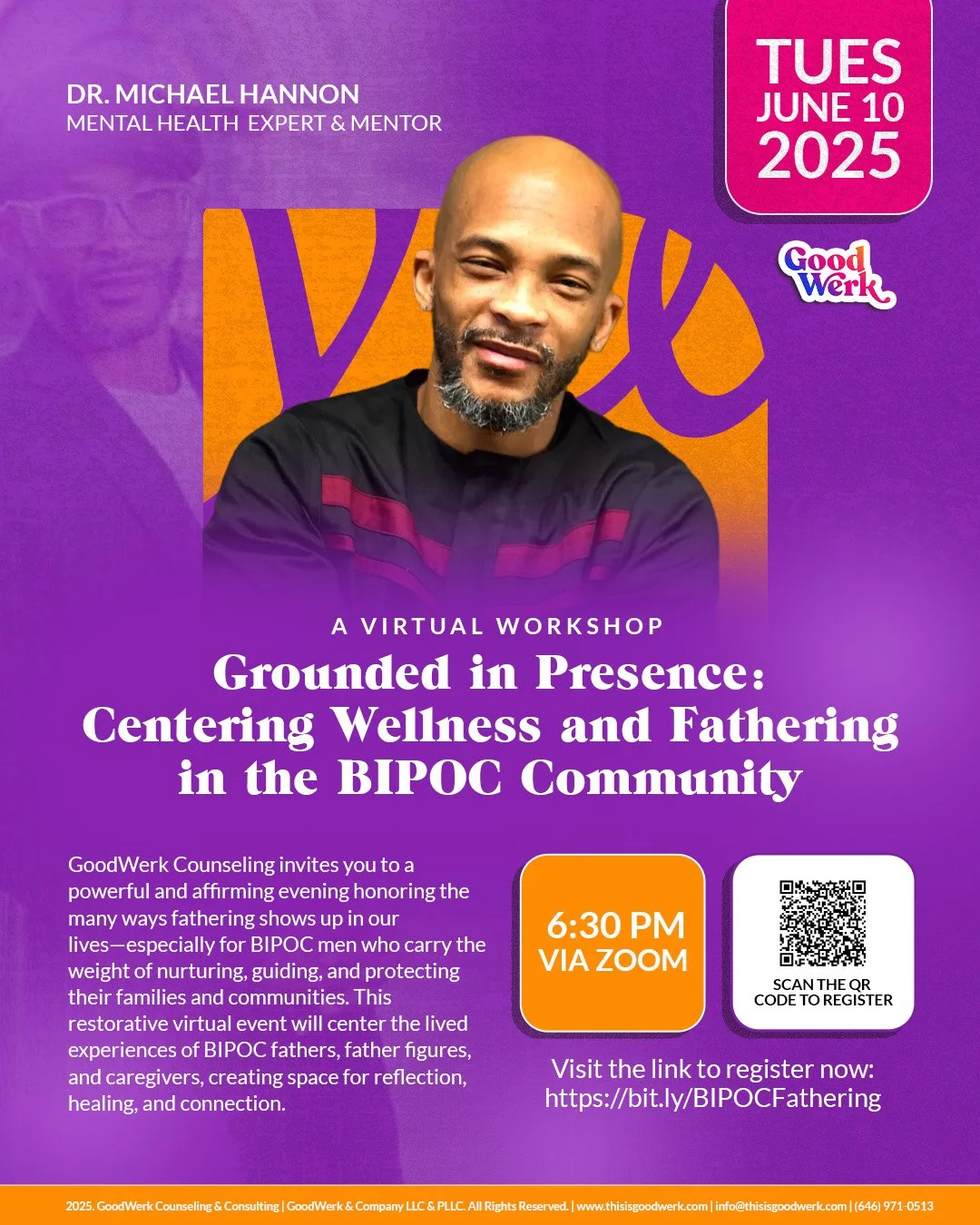
Grounded in Presence: Centering Wellness and Fathering in the BIPOC Community
Led by Dr. Michael Hannon, this restorative virtual session will center the lived experiences of BIPOC fathers, father figures, and caregivers, creating space for reflection, healing, and connection.
In BIPOC communities, fathering holds a rich, often under-recognized legacy. It’s not just about being a provider; it’s about being a presence. Whether you're a biological father, stepfather, uncle, coach, mentor, or a chosen family member—your role matters. And your care matters. Whether as biological fathers, stepfathers, uncles, mentors, coaches, or community leaders, BIPOC men are constantly engaging in care work that is too often overlooked or underappreciated.
For many, fathering includes navigating trauma, systemic pressures, and generational cycles while striving to offer love, structure, and emotional availability. This session will explore the complexities of fatherhood, challenge outdated stereotypes, and hold space for vulnerability, joy, and the power of being fully present.
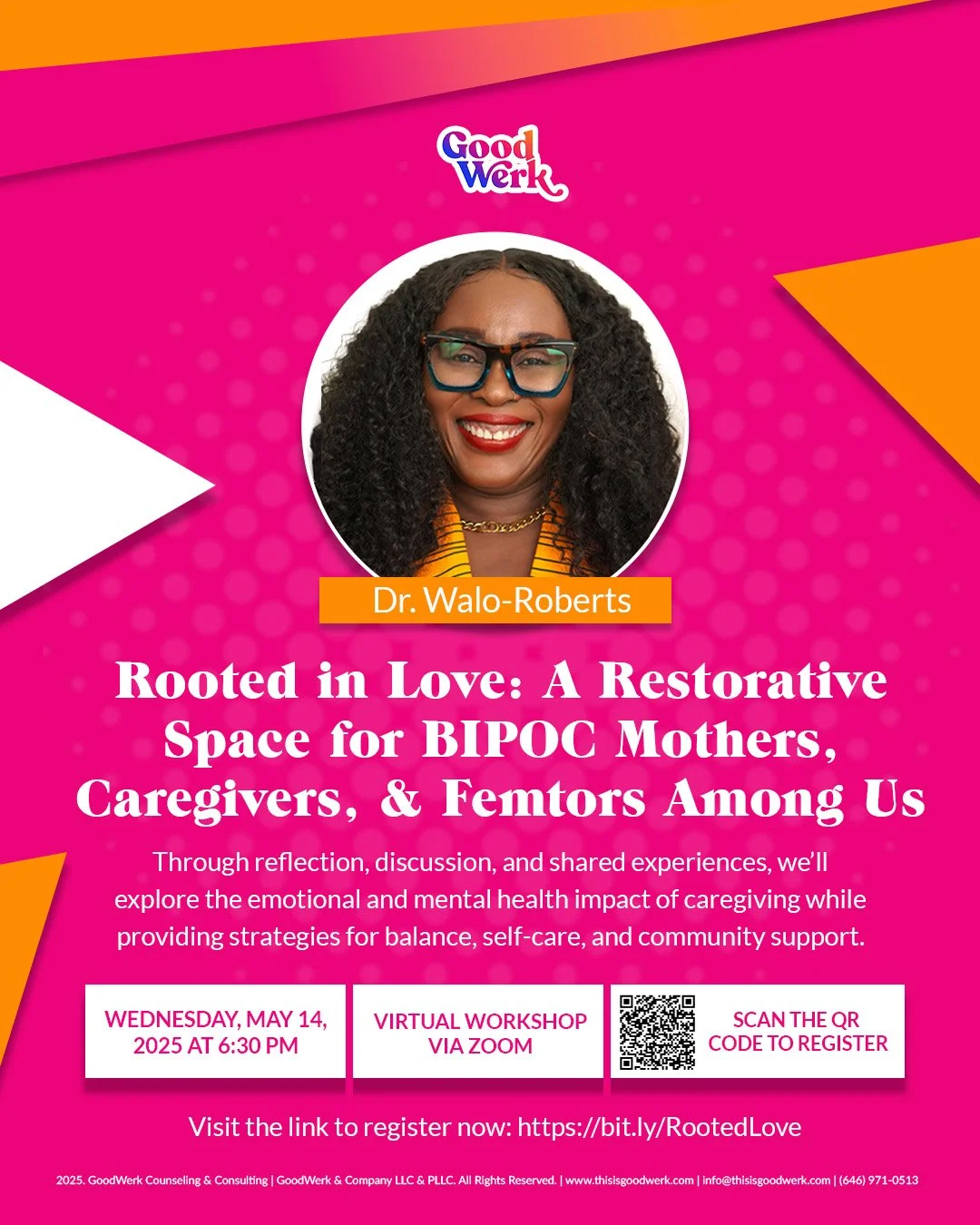
Rooted in Love: A Restorative Space for BIPOC Mothers, Caregivers, & Femtors Among Us
For BIPOC women, mothering takes many forms. Whether raising a child, mentoring the next generation, or fostering community, this labor of love is powerful—but it can also be exhausting. BIPOC working mothers often find themselves navigating workplace demands while ensuring their children receive the care and attention they need. Additionally, many BIPOC caregivers serve as guiding forces for younger family members, students, and community members, embodying the essence of mothering beyond DNA. Adoption, mentorship, and chosen family are all vital ways that mothering shows up in BIPOC communities, reminding us that the heart of mothering is about love, support, and presence.
Led by Dr. Sailume Walo-Roberts, this interactive virtual session will explore the emotional and mental health aspects of nurturing others, highlighting the joys and challenges that come with offering love and support in a world that often overlooks the caregivers.
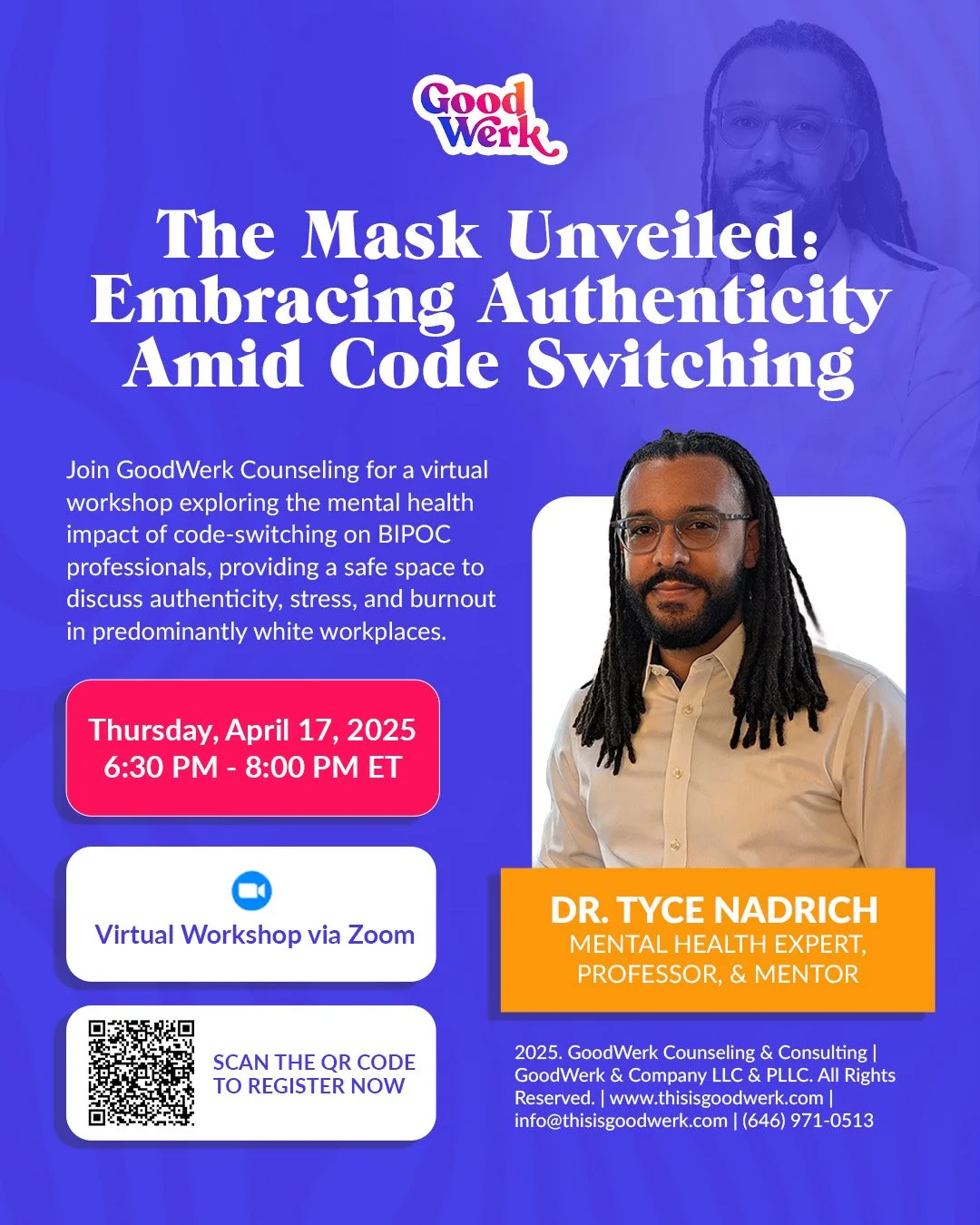
The Mask Unveiled: Embracing Authenticity Amid Code Switching
Led by Dr. Tyce Nadrich, this interactive virtual session will provide a safe, affirming space to explore the emotional and psychological toll of adapting one’s speech, behavior, and appearance to conform to workplace norms. While code switching can be a strategic tool for navigating professional environments, it may also lead to feelings of inauthenticity, heightened stress, and burnout.
During this session, we will delve into the concept of code switching and its dual role as both a survival mechanism and a source of emotional strain, the subtle ways in which constant adaptation can impact mental well-being and personal identity, and adaptive coping mechanisms—including mindfulness practices, assertive communication strategies, and self-care routines—that empower participants to maintain authenticity while effectively navigating professional spaces.

The Art of Intimacy: Creating Meaningful Connections
Beyond the romantic and physical—intimacy encompasses emotional, intellectual, spiritual, and experiential dimensions. This special community event aims to demystify intimacy, providing participants with the tools to learn tools and language, understand their preferences, nurture their connections, and honor the diverse ways others express intimacy.
Facilitated by Founder and Executive Director, Dr. Alfonso Ferguson, this 90-minute complimentary virtual event will support participants provide a safe and affirming space to explore the intimacy spectrum in order to foster stronger relationships with partners, friends, or oneself.

Wellness Beyond Resolutions: Practices for Sustained Well-being
As we enter the new year, GoodWerk Counseling invites clients to rethink the common tradition of setting resolutions and instead focus on implementing or maintaining holistic wellness practices.
Facilitated by Mental Health Expert, Dr. Ebony White, this 90-minute complimentary virtual event will support participants to explore ways to build resilience, prioritize self-care, and foster connections that support their wellness over the long term.

Coping with Grief During the Holidays
Coping with grief can be especially challenging during the holiday season when memories of loved ones and family gatherings may magnify feelings of loss.
Facilitated by Grief Expert, Dr. Raman Jaur Mohabir, this 90-minute complimentary virtual event will be a safe space to learn and share insights on common grief experiences and practical tips for navigating the holidays and New Year ahead.

Culturally Responsive Counseling Practice for BIPOC LGBTQIA+ Clients
In the last three decades, there has been an increase in the amount research on members of racial and ethnic minority communities; the importance of multiculturalism; counselor cultural competence; and lesbian, gay, bisexual, transgender, queer (LGBTQ) issues (see Cass, 1979; Crenshaw, 1989, 1991; Cross, 1971, 1978; Goldberg & Kuvalanka, 2012; Helms, 1990; Ratts et al., 2016; Sue et al., 1992; Wolfson, 1994). Despite the increase in research about people from marginalized communities, there remains little research and counseling practices that interrogate the holistic experiences of BIPOC LGBTQIA+ clients. This webinar examined current research on the lived experiences of clients with intersectional marginalized identities, including counseling implications for providing cultural responsive care and affirming practices.
